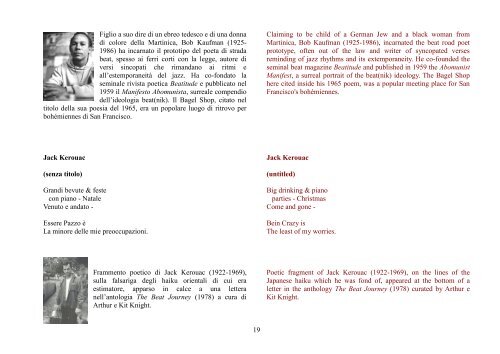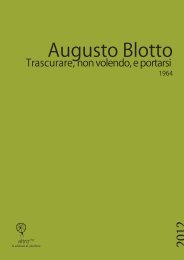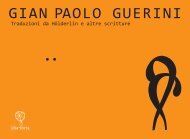Create successful ePaper yourself
Turn your PDF publications into a flip-book with our unique Google optimized e-Paper software.
Figlio a suo dire di un ebreo tedesco e di una donna<br />
di colore della Martinica, Bob Kaufman (1925-<br />
1986) ha incarnato il prototipo del poeta di strada<br />
beat, spesso ai ferri corti con la legge, autore di<br />
versi sincopati che rimandano ai ritmi e<br />
all’estemporaneità del jazz. Ha co-fondato la<br />
seminale rivista poetica Beatitude e pubblicato nel<br />
1959 il Manifesto Abomunista, surreale compendio<br />
dell’ideologia beat(nik). Il Bagel Shop, citato nel<br />
titolo della sua poesia del 1965, era un popolare luogo di ritrovo per<br />
bohémiennes di San Francisco.<br />
Jack Kerouac<br />
(senza titolo)<br />
Grandi bevute & feste<br />
con piano - Natale<br />
Venuto e andato -<br />
Essere Pazzo è<br />
La minore delle mie preoccupazioni.<br />
Frammento poetico di Jack Kerouac (1922-1969),<br />
sulla falsariga degli haiku orientali di cui era<br />
estimatore, apparso in calce a una lettera<br />
nell’antologia The Beat Journey (1978) a cura di<br />
Arthur e Kit Knight.<br />
19<br />
Claiming to be child of a German Jew and a black woman from<br />
Martinica, Bob Kaufman (1925-1986), incarnated the beat road poet<br />
prototype, often out of the law and writer of syncopated verses<br />
reminding of jazz rhythms and its extemporaneity. He co-founded the<br />
seminal beat magazine Beatitude and published in 1959 the Abomunist<br />
Manifest, a surreal portrait of the beat(nik) ideology. The Bagel Shop<br />
here cited inside his 1965 poem, was a popular meeting place for San<br />
Francisco's bohémiennes.<br />
Jack Kerouac<br />
(untitled)<br />
Big drinking & piano<br />
parties - Christmas<br />
Come and gone -<br />
Bein Crazy is<br />
The least of my worries.<br />
Poetic fragment of Jack Kerouac (1922-1969), on the lines of the<br />
Japanese haiku which he was fond of, appeared at the bottom of a<br />
letter in the anthology The Beat Journey (1978) curated by Arthur e<br />
Kit Knight.




